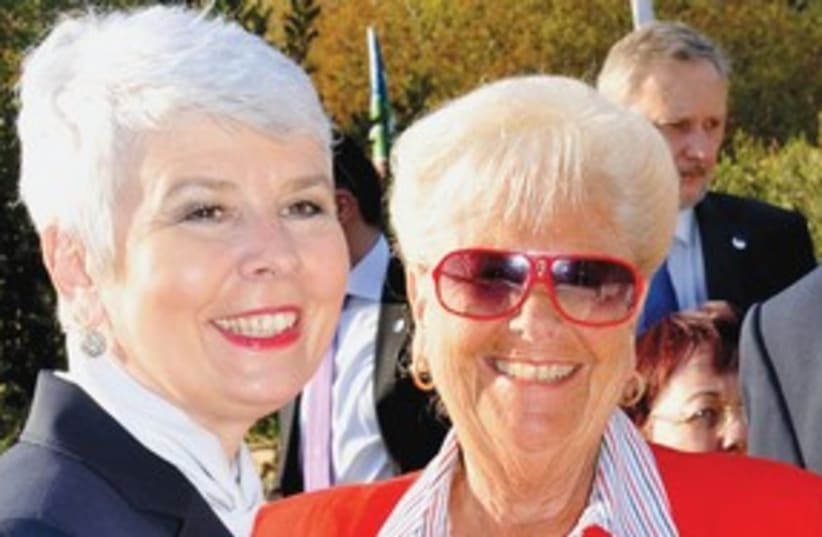Roll of honorThe other torch lighters are:• Orit Dror, a member of Kibbutz Lavi who, together with her husband, donated her son’s organs after he died of a terminal illness, and saved the life of a 13-year-old girl;• Zehava Dankner (mother of businessman Nochi Dankner), a philanthropist who supported, among others, residents surrounding Gaza, and who is involved in matters of education, security and health;• Rabbi Shimon Rosenberg, a member of the Chabad movement, who lost his daughter and son-in-law in the November 2008 terrorist attack at the Chabad house in Mumbai;• Sa’ar Shapira, an 11th-grade student at the Reali School in Haifa. Shapira was a volunteer firefighter along with his friend Elad Riven, 16, who ran out to help fight the fire on the Carmel and paid with his life;• Arij Rahab, the first female Druse officer in the Prisons Service;• Holocaust survivor Michael Goldman Gilad, who joined the police force after coming to Israel, and headed the team that interrogated Adolf Eichmann;• Physicist and former refusenik Zeev Dashevsky, who established the Mahanayim institution to teach Jewish and Zionist values to new immigrants;• Col. (res.) Omer Bar-Lev, who was a General Staff commander in the IDF, and today chairs Aharai (After Me), an organization dedicated to persuading youth from peripheral communities to join the army;• Former MK Matityahu Drobeles, who headed the Settlement Department of the Jewish Agency and worked tirelessly to establish new settlements throughout the country;• Hosha Friedman Ben-Shalom, a colonel in the reserves who does 165 days a year of reserve duty and heads the pre-military training school Beit Yisrael, which has a mixed religious-and-secular student body;• Gadi Bashari, founder of the Sweet Heart organization, which assists soldiers, the disabled, and new immigrants of every background;• Yobi Teshuma, who immigrated from Ethiopia in 1984 and in 2005 founded Friends in Nature, an organization committed to helping Ethiopian immigrants.
From New Jersey to Mount Herzl
Veteran American immigrant and longtime Hadassah woman Barbara Goldstein is being honored at tonight’s Independence Day ceremony.

Roll of honorThe other torch lighters are:• Orit Dror, a member of Kibbutz Lavi who, together with her husband, donated her son’s organs after he died of a terminal illness, and saved the life of a 13-year-old girl;• Zehava Dankner (mother of businessman Nochi Dankner), a philanthropist who supported, among others, residents surrounding Gaza, and who is involved in matters of education, security and health;• Rabbi Shimon Rosenberg, a member of the Chabad movement, who lost his daughter and son-in-law in the November 2008 terrorist attack at the Chabad house in Mumbai;• Sa’ar Shapira, an 11th-grade student at the Reali School in Haifa. Shapira was a volunteer firefighter along with his friend Elad Riven, 16, who ran out to help fight the fire on the Carmel and paid with his life;• Arij Rahab, the first female Druse officer in the Prisons Service;• Holocaust survivor Michael Goldman Gilad, who joined the police force after coming to Israel, and headed the team that interrogated Adolf Eichmann;• Physicist and former refusenik Zeev Dashevsky, who established the Mahanayim institution to teach Jewish and Zionist values to new immigrants;• Col. (res.) Omer Bar-Lev, who was a General Staff commander in the IDF, and today chairs Aharai (After Me), an organization dedicated to persuading youth from peripheral communities to join the army;• Former MK Matityahu Drobeles, who headed the Settlement Department of the Jewish Agency and worked tirelessly to establish new settlements throughout the country;• Hosha Friedman Ben-Shalom, a colonel in the reserves who does 165 days a year of reserve duty and heads the pre-military training school Beit Yisrael, which has a mixed religious-and-secular student body;• Gadi Bashari, founder of the Sweet Heart organization, which assists soldiers, the disabled, and new immigrants of every background;• Yobi Teshuma, who immigrated from Ethiopia in 1984 and in 2005 founded Friends in Nature, an organization committed to helping Ethiopian immigrants.